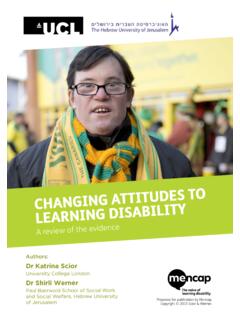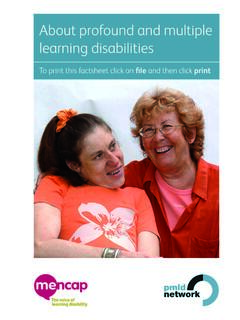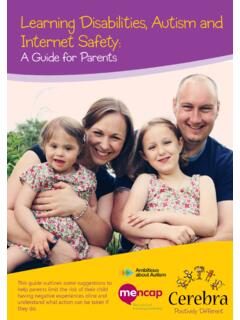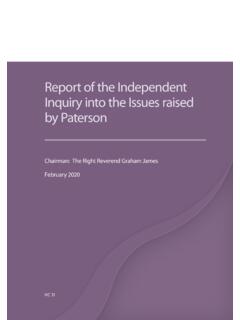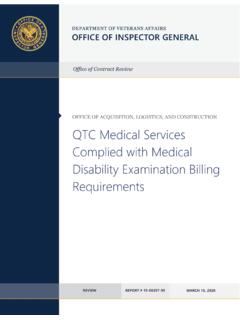Transcription of Death by indifference - Mencap
1 Death by indifferenceFollowing up the Treat me right!reportContentsIntroductionpage 1 About this reportpage 2 Introduction to the case studiespage 4 Emmapage 6 Markpage 8 Martinpage 10 Tedpage 12 Tompage 14 Warrenpage 16 This report s main contentionspage 18 What Mencap wants to happenpage 25 Appendix: Treat me right! the story so farpage 28 We believe that Mark died unnecessarily. Throughout his life, we encounteredmedical professionals who had no idea how to deal with people with a learningdisability or what it is like to be a parent of someone with a learning disability to know their suffering, to see their distress. If only they would Allan, father of Mark, who died in August 2003 of bronchopneumonia Mark s family believe that the doctors and nurses treating him failed tounderstand his medical needs or appreciate the seriousness of the conditionthat led to his Death . They believe that this was mainly because Mark had alearning disability.
2 They also believe that if the medical staff had listened tothem and what they knew about Mark, his life could have been believes that Mark s family is right. We believe that the real, underlyingcause of Mark s Death and those of many other people with a learningdisability who die in hospital is the widespread ignorance and indifferencethroughout our healthcare services towards people with a learning disability,and their families and carers. We say that this is a national disgrace. We say this is institutional by indifference Introduction1 IntroductionThis report will set out why we believe there is institutional discriminationwithin the NHS, and why people with a learning disability get worse healthcarethan non-disabled people. We present the stories of six people who we believehave died unnecessarily. We do so because healthcare professionals need torealise the serious even fatal consequences of their lack of do so to point out that these professionals must work to ensure that suchtragedies can never happen report follows on from Mencap s Treat me right!
3 report and campaign in2004, which exposed the unequal healthcare that people with a learningdisability often receive from healthcare professionals. The report made clearthat much work needs to be done within the NHS to ensure that people with alearning disability are treated decently and the launch of our Treat me right!campaign, many cases of appallingtreatment of people with a learning disability in hospitals around the countryhave come to light. The six cases presented in this report share common our view, they raise serious concerns about the way people with a learningdisability are treated within our healthcare system. The Disability Rights Commission (DRC) recently published the results of aformal investigation into physical health inequalities experienced by peoplewith learning disabilities and mental health problems1. The investigationshowed that people with a learning disability receive fewer screening tests andfewer health investigations.
4 It showed that people with a learning disability areless likely to get the healthcare they need. Commenting on the report , theChairman of the DRC stated that the view of the inquiry panel was that earlydeaths in these groups are not acceptable and that they had encountered complacency and a lazy fatalism that these groups just do die younger 2. But the fact is, that shocking and tragic as these reports are, there has been anastonishing lack of response to them at Government level. Health inequalitieshave been widely documented and the solutions clearly identified includingthe need for a confidential inquiry into premature deaths, annual health checksand staff training. But nothing has been done. There has been no action to2 Death by indifference About this reportAbout this reportprevent the disgracefully poor treatment that continues to be reported toMencap. No action has been taken to stop other deaths like the six you will readabout in this report .
5 That is why this report is called Death by indifference . This is a wake up call for the NHS. It is simply not doing enough to ensure areasonable standard of treatment for people with a learning disability. Callingfor discriminatory practices to be eliminated, the DRC1report states that in theabsence of systemic national action to close the gaps of inequality, service usersremain caught in a policy Catch 22 situation . Warning that the Governmentcould face legal challenge under new disability equality laws,3the DRC statesthat a clear lead needs to come from the Department of Health and the WelshAssembly Government in taking action and ensuring that others take action . It is clear that change needs to happen without further loss of by indifference About this report3 After Mencap published the Treat me right! report we were contacted by thefamilies of Emma, Mark, Martin, Ted, Tom and Warren. Each family has anunderstandable desire to fully understand why their family member died.
6 Whatthey also share is the motivation to achieve systemic change that will benefitothers in the future. Each case is currently at a different stage of the complaints process. Thepurpose in including them in this report is to show that they have commonstrands, and that a series of interwoven actions resulted in those concernedgetting unequal treatment. The actions of the individual health professionalsconcerned are a matter for those individual complaints processes. However, it is our belief, and that of their families, that their deaths wereavoidable and that institutional discrimination is the underlying cause. We believethat they occurred because of discrimination, indifference , lack of training and avery poor understanding of the needs of people with a learning disability. It is difficult to determine whether any of the individual doctors and nursesinvolved consciously discriminated against the people featured in this families known to Mencap report the words that health professionals havesaid to them, such as: If she had been a normal young woman we would not hesitate to treat her.
7 Wouldn t it be better for everyone if we just let him go? In my opinion there is nothing wrong with him and I am not usually wrong. It sjust the way he is. While families obviously vividly recall these statements, such words would notbe recorded in case notes and are hard to prove. Neither would the attitudesdisplayed by healthcare professionals that result in such a level of fear andmistrust that some families feel the need to mount bedside vigils when theirloved ones are in hospital. Direct discrimination is hard to prove, but this doesnot mean that it does not exist. 4 Death by indifference Introduction to the case studiesIntroduction to the case studiesIt could also be argued that the health professionals concerned did not intend toact maliciously, but held mistaken beliefs about patients with a learning example of the level of ignorance about patients with a learning disability isdemonstrated in a recent report about responding to the pain experiences ofpeople with learning difficulties and dementia4.
8 The report explored the reasonwhy some people did not receive appropriate pain control while in hospital. Itfound that a further barrier to pain recognition was the generalised butconcerning belief that people with a learning difficulty have a high painthreshold . It is important to remember that, under the Disability DiscriminationAct (DDA), discrimination that is unintentional is still against the Mencap s view, it is this type of widespread ignorance that results ininstitutional discrimination. It means that the practice, policy, procedures andsystems followed by the healthcare staff are not grounded in a properknowledge of the needs of people with a learning disability. But there isabsolutely no excuse for ignorance of this kind. It is not that the health andtreatment needs of people with a learning disability are unknown. They havebeen recognised for many years. There is also evidence of some very goodpractice in the NHS but this has not been implemented more widely.
9 We knowthat there is a growing awareness of the problems. However, there is also alethargy in tackling them. It is our view that allowing this shocking level ofignorance to continue is further evidence that there is institutionaldiscrimination within the NHS. In the six case studies that follow, we have provided a short summary of thecomplex amount of information that we have gained from the families and thereports and correspondence relating to the complaints process. The informationon each case is, to the best of our knowledge, accurate at the point of going toprint. But we will only know what really happened and whether their deathscould have been avoided if there is a thorough independent by indifference Introduction to the case studies5 Emma died of cancer on 25 July 2004, aged just 26. She had a severe learningdisability, which meant that she sometimes exhibited challenging behaviourand had difficulty in communicating how she felt. The hospital delayedtreating her because they said she would not co-operate with treatment andtherefore could not consent to treatment.
10 Emma s family has complained to the hospital and subsequently to theHealthcare She had agreat sense ofhumour andloved pullingfaces for alaugh! She hadwonderful smilesthat could lightup a room. Determined, fun,caring, are thethings I thinkabout when I think of Emma. Emma s mother first took her to her GP because Emma had not eaten for eight days. Her GPsuggested it might be a virus. Her mother was not satisfied, as Emma was very unwell andstill not eating. She decided to find another month later, Emma was admitted to a surgical ward at the hospital with a swelling in hergroin. She had an X-ray, and a scan culminating in a biopsy. While she was in hospital, Emmawas distressed and in pain. She was not eating and couldn t take a painkiller orally. Thehospital found Emma s behaviour very difficult to manage. Emma was discharged from thehospital on the grounds that there was nothing more they could do for her. She was senthome without any help to control her days later Emma and her mother went back to the hospital to get the results of thebiopsy.

